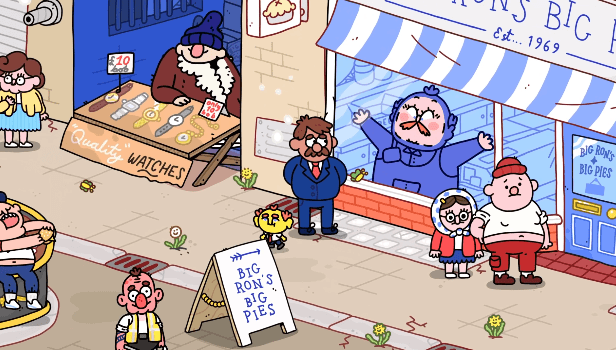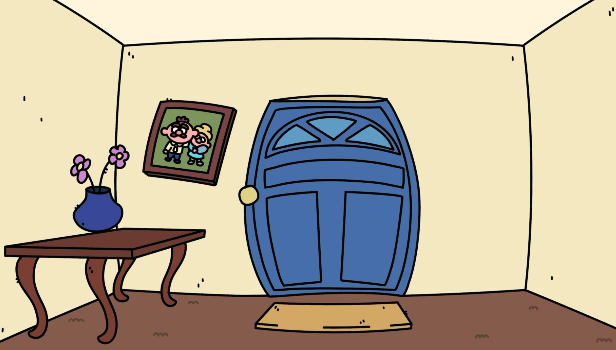Trending
Opinion: How will Project 2025 impact game developers?
The Heritage Foundation's manifesto for the possible next administration could do great harm to many, including large portions of the game development community.

It's grim up North. It is also bloody wonderful. A land filled with hallowed stodge. Pies and gravy. Buttery chip barms. Corned beef and tattie hash. It's a realm with more dialects than common sense. Broad accents. Yawning vowels. Enunciation? Pure myth. Industrial roots run deep. Change comes slowly, but somehow that's no bad thing. You make do and crack on.
Thank Goodness You're Here! leans into that roughshod, redbrick vision of England. The "comedy slapformer," developed by Coal Supper and published by Panic, is an offbeat palette cleanser that dares to be different. It's equal parts puzzler and sketch show, whisking players away to the fictional town of Barnsworth so they can help the locals run absolutely crackpot errands.
The interactive elements are kept light. You can jump and slap objects while exploring a series of interlocking vignettes–and that's about it. Coal Supper co-founders Will Todd and James Carbutt (who both hail from the Yorkshire town of Barnsley) explain that was a deliberate choice made in service of their own irreverent, farcical, and slightly raunchy brand of comedy.
"Early on, we reconciled that humor is all we've really got," says Carbutt, speaking to Game Developer ahead of launch. Initially, he explains Thank Goodness You're Here! had more robust gameplay elements. There were deeper puzzles, non-linear elements, more complex controls. That all fell away when Carbutt and Todd realized that striving to make a puzzle-first experience would be incredibly counterproductive.
"We realized that if we make a puzzle game, and it's not great, then we've made a bad puzzle game," says Carbutt, who explains the pair instead decided to focus on what they're "pretty good at." Being absolutely ludicrous.
"Something we landed on early, before there was even a town that was ostensibly Barnsley or anything, was this idea of distinct compositions or vignettes," adds Todd. Exploring that concept convinced the duo there should be fewer "verbs" in the game–largely because they questioned whether more complex interactions, such as asking players to physically lug objects around the world, would actually work in a title that was disparate by design.
"In a way it was a technical limitation [we imposed ourselves], but it also let us lean away from being a puzzle game or any other genre into putting the comedy forward. So that's why basically we only have one interact button," he says. "Secretly, it's just a short film where the player is pressing 'play' every so often."

Putting the comedy forward involved slowly teasing scenarios out of gags. The joke would come first, and if they were still laughing a week later they'd begin figuring out how to turn an abstract jape into something more tangible.
"Early on, we really had no clue [how to make it work]. We tried to come up with bits and then ask 'how do we get from A to B,'" says Todd. "We got really experimental with it, but I think what worked was very slowly teasing gameplay and narrative out of the gags. If we were still laughing after a week we asked 'how does this fit? What does the player do on-screen while this is happening? Should it just be a cutscene or should we have interaction in there?'"
Thank Goodness You're Here! was initially a more non-linear experience. Players were able to complete tasks in any order, ambling through Barnsworth at their own behest. The idea was to give players more freedom, but playtesting proved that's not always a boon. "We found that people were often in the wrong areas, just doing laps through pathways and missing the one thing they were supposed to do," says Todd. "So basically we just realized we should just put this on-rails and it'll still work. We can have a more tight, curated experience where you can only do certain things enough times to see the jokes unfold."
The vignettes themselves remained freeform to some degree. Players can explore areas and interact with objects to find jokes that have been squirrelled away, but moving between those sections is a one-way street. "I don't feel like we lost too much by taking that big sprawling flowchart of branching paths and just laying it out in a straight line, because you get to the meat either way."
Testing for design is relatively straightforward. You cobble together various elements and see how players react. Testing for comedy is a more intuitive task, especially in the case of Thank Goodness You're Here!–which was in development for over four years and draws on the personal experiences of both Todd and Carbutt. It meant both creators had to follow their instincts and believe in their barmy brand of buffoonery.
"It's very difficult to [test comedy] because it's a joke you're telling in private for four years, and then in public once," says Carbutt. "So much of the humor is in the dialogue and the characters and the minutiae of their facial expressions, you don't actually know [whether it'll land] until it's all done.
"Early on, we decided we need to stick to our guns and what we find funny. Then if it doesn't quite hit the mark and miss, then at least we haven't pandered and then missed. We've made something unique in our tone of voice, and that's interesting. The truth is some of the jokes haven't worked. They don't make a lot of sense. People don't quite understand them but people seem to be quite forgiving because it's a nice world to exist in. It's something we struggled with, but the bottom line is 'go with your gut.'"
Coal Supper's debut project, The Good Time Garden, was equally absurd but still found an audience. That early success was a proof-of-concept the pair could reference when refining their silliness in Thank Goodness You're Here!. The fact the title is essentially a sketch show–reminiscent of classics like Monty Python and The Fast Show–also helped. It means those gags that don't stick rarely outstay their welcome, letting Todd and Carbutt swing for the fences without fear.
"I think the fact that we didn't really go in with a broad story circle and say 'here are all the characters we need to develop as people' really helped. It's like sketch comedy basically," says Todd. Carbutt agrees and hopes the pacing of the experience, which shifts gears at speed, means it won't become "too grating."

Perhaps the most compelling aspect of Thank Goodness You're Here! is the gaudy northern whimsy slathered onto every pixel. It'll be fascinating to see how the game lands with an international audience–and even those Brits who have spent most of their years confined to the South. The poor sods.
It feels like a love letter to the very foundations of England. A jovial ode to a working class bedrock that's rarely the centerfold in mainstream media. Carbutt and Todd looked everywhere to capture that underrepresented side of the country. The dustbins that lined the streets of their hometown. British comics like Beano and The Dandy. The nonsensical imagery you might inexplicably find on the walls of a Toby Carvery. And those traditional dialects you can still hear on the pothole-strewn tarmac across the country.
That wasn't necessarily the plan from the outset. Carbutt says the pair never sought to make the 'English Game,' but after workshopping the earliest vignettes using their own voices and accents, it felt natural to simply lean into their heritage.
In reality, the big motivation was doing something "fun" for themselves. They find joy in the chaos of misdirection. Teeing up a gag only to befuddle and bemuse. Weaponizing wordplay and double entendre with reckless abandon. "Doing stupid voices and getting paid for it," chimes in Todd.
"Having fun was always the big motivation. We never said 'let's make an indie video game to have a really good work-life balance and healthy salary," he continues. "It was always what we enjoyed doing. That was the big motivating factor. It's just what feels right to us."
You May Also Like